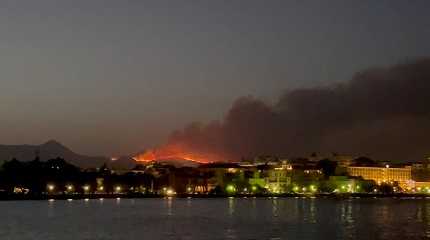
RHODES, Greece, July 24 (Reuters) - Tour operators flew more than 2,000 holidaymakers home on Monday as wildfires raged on the island of Rhodes in what the Greek government said was the largest evacuation ever undertaken in the country.
More repatriation flights were due on Monday and Tuesday as the fires remained out of control and the Civil Protection authority warned the threat of further fires was high in almost every part of Greece, gripped by a heatwave.
Fires burning since Wednesday on Rhodes forced 19,000 people to leave homes and hotels over the weekend as an inferno reached coastal resorts on the island's southeast. A wildfire also led to evacuations on the island of Corfu.
Rhodes and Corfu are among Greece's top destinations for tourists mainly from Britain and Germany.
"For the next few weeks we must be on constant alert. We are at war, we will rebuild what we lost, we will compensate those who were hurt," Greek Prime Minister Kyriakos Mitsotakis told parliament.
"The climate crisis is already here, it will manifest itself everywhere in the Mediterranean with greater disasters."
After leaving hotels and resorts, many tourists spent the night on Rhodes airport floor, waiting for repatriation flights, the first of which left overnight.
From Sunday until 3 p.m. (1200 GMT) on Monday, 2,115 tourists were flown home, mainly to Britain, Germany and Italy, on 17 flights, the Greek transport ministry said. Government spokesman Pavlos Marinakis described the evacuation as the largest undertaken in the country.
British Foreign Office Minister Andrew Mitchell estimated that up to 10,000 Britons were on the island.
At Cologne-Bonn Airport, returning German tourists talked of holidays in the sun turned into torment, one relating how her family had to walk 11 km (7 miles) to safety.
"We wanted to drink and people were standing at their houses and sprayed us from their hoses and we drank out of the hoses. Everyone was just walking and we didn't know where to," Violetta Kaczmarzyk told Reuters.
Others expressed their relief to have escaped. For local residents though, there was no let-up.
In the southern resort of Kiotari, smoke wafted across its empty beach and a singed Greek flag waved over a burned-out truck. Many local residents sheltered at a restaurant near the coast, fearing for their homes. Others poured sea water into a large tank stacked on a truck to battle the flames.
"The wind is very high today. It will be worse Wednesday. It's very, very bad, the situation. We need help. Send us help from everywhere," said local resident Lanai Karpataki.
REPATRIATION FLIGHTS
TUI (TUI1n.DE) took three plane loads of passengers back to Britain overnight, Britain's easyJet (EZJ.L) laid on two additional flights on Monday and Jet 2 had three extra flights for 600 people. Air France was also flying from Rhodes with increased capacity.
Ryanair Chief Executive Michael O'Leary said his airline had not seen passengers seeking to cancel flights to Rhodes over the weekend, given fires were more in the south of the island and the airport and most resorts in the north.
On Corfu, nearly 2,500 people were offered shelter, including in stadiums, although many returned to their hotels on Monday.
Greece is often hit by wildfires during the summer months but climate change has led to more extreme heatwaves across southern Europe, raising concerns that tourists will stay away.
Tourism accounts for 18% of Greece's GDP and one in five jobs. On Rhodes and many other Greek islands, reliance on tourism is even greater.
Civil Protection said practically every region of Greece was facing the threat of wildfires on Monday ranging from high, very high to state of alert.
Temperatures over the past week have exceeded 40 degrees Celsius (104 degrees Fahrenheit) in many parts of the country and were forecast to persist in the coming days.
Emergency services were also dealing with fires on the island of Evia, east of Athens, and Aigio, southwest of Athens.




